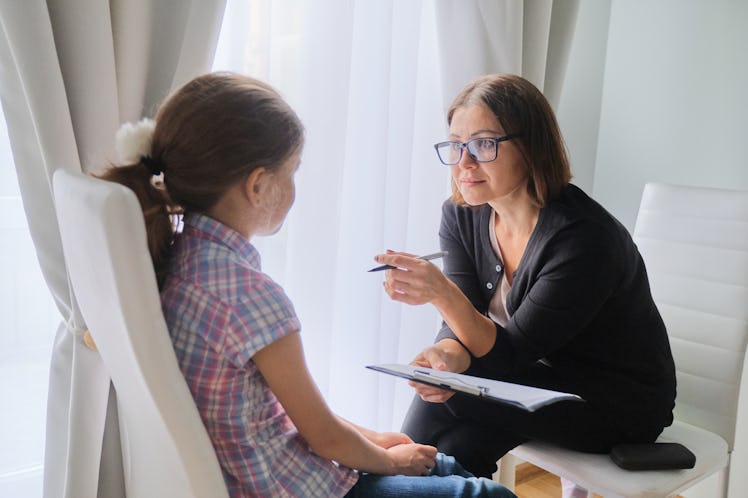Biden Will Finally Beef Up Mental Health Resources At Schools
Our kids are currently struggling with a mental health crisis.

The Biden Administration is stepping up to address our youth mental health crisis, and not a moment too soon. Even before the pandemic brought about social isolation, trauma, and loss on a scale not seen before, America’s youth were struggling. Since the pandemic, however, research shows the mental health of America’s tweens and teens has tanked, and our schools are not equipped to address the needs of the kids they serve.
Data released by the Centers for Disease Control and Prevention earlier this year shows that during the first year of the COVID-19 pandemic, 44% of teens reported a feeling of sadness or hopelessness that persisted for longer than two weeks, 20% of teens considered suicide, and almost 10% reported at least one suicide attempt. Within marginalized communities, those numbers are even higher.
There’s a Shortage of School Mental Health Personnel
One challenge teens and school districts face is a noted lack of mental health personnel in schools. "There's a shortage of mental health professionals writ large in the country, whether it's community or school-based," Kathy Cowan, director of communications for the National Association of School Psychologists (NASP), told ABC News. "There is a long-term shortage of school-employed, mental health professionals."
Currently, the average ratio of student to mental health personnel in schools is 1,162:1, while the National Association of School Psychologists (NASP) recommends a ratio of 500:1. The NASP recommends hiring school psychologists, guidance counselors, and social workers as each performs different functions within the school and with the student body.
Biden Will Provide Funding to Address the Mental Health Crisis in Schools
Using funds allocated from the Bipartisan Safer Communities Act (BSCA), a new anti-gun violence law, the Biden Administration plans to make good on the President’s promise to address the dearth of mental health infrastructure and support in schools.
The Administration is earmarking a total of $1 billion in funding over five years to increase the number of mental health professionals in schools. The first round of funding, $280 million, will be in the form of a series of competitive grants aimed at beefing up recruiting and training of school mental health personnel.
“For too long, schools have lacked the resources to hire enough school-based mental health providers, when at the same time, educators are often first to notice when a student is slipping academically or struggling because of mental health challenges," U.S. Secretary of Education Miguel Cardona said in a statement.
"We know children and youth can’t do their best learning when they’re experiencing depression, anxiety, and other mental health challenges whether they stem from community violence, social isolation from the pandemic, loss of loved ones, bullying, harassment, or something else. This funding from the Bipartisan Safer Communities Act will help schools raise the bar for student mental health by recruiting, preparing, hiring, and training highly qualified school-based mental health providers, including in underserved communities and for students such as multilingual learners and those from low-income backgrounds and in rural communities, where access to such services can be limited.”
How Can Schools Obtain Grant Money for Mental Health?
Schools were able to apply for funds from two separate grants — the School-Based Mental Health Services Grant, a program to increase the number of in-school mental health personnel, and the Mental Health Service Professional Demonstration Grant, which will encourage schools to partner with colleges and universities in the training of in-school mental health personnel.
Grants are limited and awarded on the basis of proven need. The Department of Education plans to award approximately 150 School-Based Mental Health Services Grants and 250 Mental Health Service Professional Demonstration Grants to schools to help with the crisis.
This article was originally published on